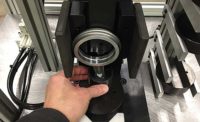When manufacturing one of its products, a floor-mounted quick-connect unit for seat belts, Hatch Stamping found it was having problems with the impact stakers it was using to press the rivets. Specifically, because of the violent impact, the horns that support the part while it was being processed were breaking. To make matters worse, over time, cracks would develop in the fixturing due to metal fatigue. Although very small, these cracks caused a slight deflection, which resulted in unacceptable parts.
"You could have 500 to 1,000 parts run in an hour that could be scrap and needed to be thrown away," says Chad Peltier, automated systems engineer at Hatch Stamping. "This, of course, resulted in sorting costs, scrap costs and downtime. The cost of one reject alone was between $10,000 to $60,000."
To correct the problem, Hatch Stamping implemented a hydropneumatic press from Schmidt Technology Corp. (Cranberry Township, PA). Using the new system, Hatch Stamping is now able to accurately control ram stroke energy, which results in a very precise, smooth pressing action. During each press cycle, the approach stroke proceeds rapidly under low force. Once the press encounters the resistance of the part, it activates the power stroke, during which it applies its maximum force. Each press is equipped with a precision-ground ram guided by adjustable Teflon-lined gibs and maintenance-free bearing surfaces. The result is that Hatch Stamping put an end to its quality problems, and also experienced an increase in throughput.
"With a Schmidt press you are not distorting or affecting any of the tooling, and we are running a lot more parts," Peltier says. "We were previously getting 1,500 parts per shift. Now, we get 5,000 parts using the more consistent Schmidt presses."
As part of the new pressing system, Hatch Stamping also implemented the Schmidt PressControl 1001 (PRC-1001), an integrated, in-process monitoring and quality assurance system. This system tracks ram position, and measures force and distance, displaying the results on an integrated monitor or a linked PC. The system receives data from a battery of fully integrated measuring devices and sensors that are positioned on the ram and generate amplified electronic signals for accurate data transfer. Because the system is not dependent on external amplifiers, there is no risk of outside noise or electronic interference.
"If something is wrong with the assembly process, rather than run 5,000 parts, then inspect them and find out we have 5,000 bad parts, we now know immediately if there's a problem even if it's the first assembly," says Hatch Stamping assembly engineer Ron Hogbin. "With integrated process monitoring, we can immediately take corrective action."
Hatch Stamping is also using the PRC-1001 to check the quality of purchased components and stampings. For example, in one gas tank cover application, the PRC-1001 stakes three studs into the stamping. If the studs on the parts, which are purchased from an outside supplier, are short, the resistance will be different when the studs are pressed into place. The PRC-1001 will note the deviation and send the assembled component down a reject chute.
For more information on stamping and process monitoring, call 800-959-1218, visit www.schmidtpresses.com or eInquiry 2.


